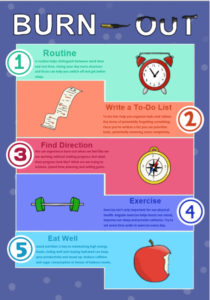Good morning everyone, today we have a guest blog from Eliott, a current postgraduate student of ours. All about burn-out and how to avoid it.
WHAT IS BURN-OUT?
Burn-out is a type of stress-induced fatigue which leads to a lack of interest in, and difficulty performing, tasks which require emotional, physical, or mental effort. While not considered a medical condition, the World Health Organisation (WHO) recognises it as an “occupational phenomenon” which may influence health. However, the symptoms of burn-out overlap with some mental health conditions, such as depression, and so it is still important to reach out to mental health services or your GP.
Burn-out occurs as a gradual process and can be treated through lifestyle changes, so it is important to recognise the signs early on. One of the most common signs of burn-out is chronic fatigue. You may find that you feel tired no matter how much rest you get, or that you tire much faster than normal. Chronic fatigue can make everything feel even more unmanageable and cause frustration, stress, and anxiety that perpetuates the decline into a burnt-out state. Other symptoms of burn-out include:
- A lack of self-care – if you find that you’ve dropped your hobbies, are neglecting sleep and/or personal hygiene, or aren’t enjoying what you’re doing this can be an indicator of an unhealthy lifestyle which can be a cause or consequence of burn-out.
- Decreased performance – heightened anxiety and low energy levels can lead to lower performance in all areas of our life, not just work. More information on this can be found in the first entry in this series.
- Emotionally volatile – sudden and unpredictable outburst of anger or sadness that are difficult to attribute to anything, or stem from frustration.
- Persistent low mood – a continuing feeling of hopelessness and disinterest, a lack of enthusiasm towards work or life.
- Isolation – this can either be intentional, because you don’t feel able to socialise due anxiety or stress, or a side effect of emotional and social exhaustion.
- Illness – the stress, fatigue, poor sleeping pattern, and unhealthy dietary choices that burn-out can lead to damage our immune system leading to frequent colds and illness.
- Despair – a pessimistic outlook, not only towards yourself but the wider world.
WHAT CAUSES IT?
Burn-out stems from the continued exposure to stress and anxiety, and a difficulty processing or letting go of these feelings. This can be caused by overwhelming workload, dissatisfying work, concern over world events, and a lack of direction amongst other factors, but is often a combination of several.
The loss of a clear divide between work time and leisure time can be a major factor in burn-out, which is why you might feel it more now. Checking your emails constantly, work Teams/Whatsapp chats pushing notifications to your phone throughout the day, and a lack of structured work hours are increasingly common problems. Telling yourself – or others telling you – that you should be more productive because you have “more free time” is a particular risk at the moment. Much of this “free time” comes as a result of the loss of access to leisure activities, the very activities that help us relieve stress and be productive.
HOW DO I STOP MYSELF FROM BURNING-OUT?
To avoid burn-out you need to take steps to combat the triggers. As these can vary from person to person, spend some time reflecting on how you feel and why. Here are some essential steps based on common experiences of burn-out:


